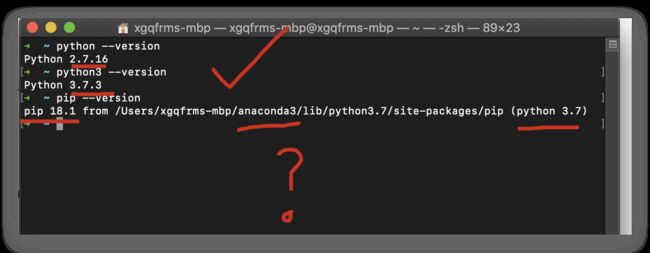PIP & Python packages management
$ python3 --version
# OR
$ python3 -V
# Python 3.7.3
$ pip --version
# pip 18.1 from /Users/xgqfrms-mbp/anaconda3/lib/python3.7/site-packages/pip (python 3.7)
➜ ~
Note: If you have Python version 3.4 or later, PIP is included by default.
https://pypi.org/project/pip/
https://pip.pypa.io/en/stable/installing/
# pip included
$ pip install pip
demo
$ pip list
$ pip install camelcase
$ pip uninstall camelcase
test.py
import camelcase
c = camelcase.CamelCase()
txt = "hello world"
print(c.hump(txt))
$ python3 test.py
$ python test.py
User Guide
https://pip.pypa.io/en/stable/user_guide/
help
➜ ~ python3 --help
usage: /Applications/Xcode.app/Contents/Developer/Library/Frameworks/Python3.framework/Versions/3.7/Resources/Python.app/Contents/MacOS/Python [option] ... [-c cmd | -m mod | file | -] [arg] ...
Options and arguments (and corresponding environment variables):
-b : issue warnings about str(bytes_instance), str(bytearray_instance)
and comparing bytes/bytearray with str. (-bb: issue errors)
-B : don't write .pyc files on import; also PYTHONDONTWRITEBYTECODE=x
-c cmd : program passed in as string (terminates option list)
-d : debug output from parser; also PYTHONDEBUG=x
-E : ignore PYTHON* environment variables (such as PYTHONPATH)
-h : print this help message and exit (also --help)
-i : inspect interactively after running script; forces a prompt even
if stdin does not appear to be a terminal; also PYTHONINSPECT=x
-I : isolate Python from the user's environment (implies -E and -s)
-m mod : run library module as a script (terminates option list)
-O : remove assert and __debug__-dependent statements; add .opt-1 before
.pyc extension; also PYTHONOPTIMIZE=x
-OO : do -O changes and also discard docstrings; add .opt-2 before
.pyc extension
-q : don't print version and copyright messages on interactive startup
-s : don't add user site directory to sys.path; also PYTHONNOUSERSITE
-S : don't imply 'import site' on initialization
-u : force the stdout and stderr streams to be unbuffered;
this option has no effect on stdin; also PYTHONUNBUFFERED=x
-v : verbose (trace import statements); also PYTHONVERBOSE=x
can be supplied multiple times to increase verbosity
-V : print the Python version number and exit (also --version)
when given twice, print more information about the build
-W arg : warning control; arg is action:message:category:module:lineno
also PYTHONWARNINGS=arg
-x : skip first line of source, allowing use of non-Unix forms of #!cmd
-X opt : set implementation-specific option
--check-hash-based-pycs always|default|never:
control how Python invalidates hash-based .pyc files
file : program read from script file
- : program read from stdin (default; interactive mode if a tty)
arg ...: arguments passed to program in sys.argv[1:]
Other environment variables:
PYTHONSTARTUP: file executed on interactive startup (no default)
PYTHONPATH : ':'-separated list of directories prefixed to the
default module search path. The result is sys.path.
PYTHONHOME : alternate directory (or :).
The default module search path uses /lib/pythonX.X.
PYTHONCASEOK : ignore case in 'import' statements (Windows).
PYTHONIOENCODING: Encoding[:errors] used for stdin/stdout/stderr.
PYTHONFAULTHANDLER: dump the Python traceback on fatal errors.
PYTHONHASHSEED: if this variable is set to 'random', a random value is used
to seed the hashes of str, bytes and datetime objects. It can also be
set to an integer in the range [0,4294967295] to get hash values with a
predictable seed.
PYTHONMALLOC: set the Python memory allocators and/or install debug hooks
on Python memory allocators. Use PYTHONMALLOC=debug to install debug
hooks.
PYTHONCOERCECLOCALE: if this variable is set to 0, it disables the locale
coercion behavior. Use PYTHONCOERCECLOCALE=warn to request display of
locale coercion and locale compatibility warnings on stderr.
PYTHONBREAKPOINT: if this variable is set to 0, it disables the default
debugger. It can be set to the callable of your debugger of choice.
PYTHONDEVMODE: enable the development mode.
➜ ~
➜ ~ pip --help
Usage:
pip [options]
Commands:
install Install packages.
download Download packages.
uninstall Uninstall packages.
freeze Output installed packages in requirements format.
list List installed packages.
show Show information about installed packages.
check Verify installed packages have compatible dependencies.
config Manage local and global configuration.
search Search PyPI for packages.
wheel Build wheels from your requirements.
hash Compute hashes of package archives.
completion A helper command used for command completion.
help Show help for commands.
General Options:
-h, --help Show help.
--isolated Run pip in an isolated mode, ignoring
environment variables and user configuration.
-v, --verbose Give more output. Option is additive, and can be
used up to 3 times.
-V, --version Show version and exit.
-q, --quiet Give less output. Option is additive, and can be
used up to 3 times (corresponding to WARNING,
ERROR, and CRITICAL logging levels).
--log Path to a verbose appending log.
--proxy Specify a proxy in the form
[user:passwd@]proxy.server:port.
--retries Maximum number of retries each connection should
attempt (default 5 times).
--timeout Set the socket timeout (default 15 seconds).
--exists-action Default action when a path already exists:
(s)witch, (i)gnore, (w)ipe, (b)ackup, (a)bort).
--trusted-host Mark this host as trusted, even though it does
not have valid or any HTTPS.
--cert Path to alternate CA bundle.
--client-cert Path to SSL client certificate, a single file
containing the private key and the certificate
in PEM format.
--cache-dir Store the cache data in .
--no-cache-dir Disable the cache.
--disable-pip-version-check
Don't periodically check PyPI to determine
whether a new version of pip is available for
download. Implied with --no-index.
--no-color Suppress colored output
➜ ~
anaconda3
➜ ~ pip -V
pip 18.1 from /Users/xgqfrms-mbp/anaconda3/lib/python3.7/site-packages/pip (python 3.7)
➜ ~ pip --version
pip 18.1 from /Users/xgqfrms-mbp/anaconda3/lib/python3.7/site-packages/pip (python 3.7)
Anaconda
Your data science toolkit
https://www.anaconda.com/
https://www.anaconda.com/products/individual
Python 3.8
https://docs.anaconda.com/anaconda/user-guide
bug
# coding: utf8
# import camelcase
# import CamelcasedModule as camelcased_module
import CamelCase as camelcase
# ModuleNotFoundError: No module named 'Camelcase'
c = camelcase.CamelCase()
# AttributeError: module 'camelcase' has no attribute 'CamelCase'
txt = "hello world"
print(c.hump(txt))
https://stackoverflow.com/questions/37589942/is-it-pep8-compliant-to-import-camelcase-as-lowercase
PEP 8
Style Guide for Python Code
https://www.python.org/dev/peps/pep-0008/
refs
https://github.com/pypa/pip
pip 20.2
https://www.w3schools.com/python/python_pip.asp
https://www.runoob.com/python3/python3-tutorial.html
https://www.runoob.com/python/python-2x-3x.html
©xgqfrms 2012-2020
www.cnblogs.com 发布文章使用:只允许注册用户才可以访问!





